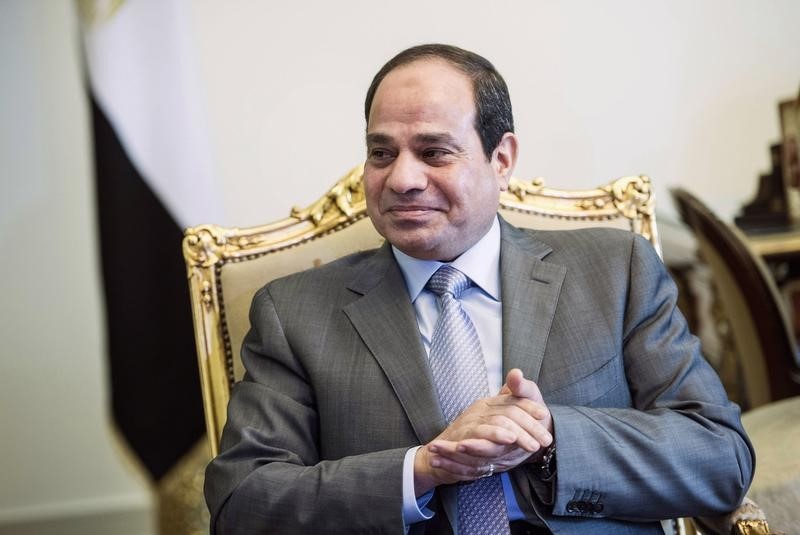(Bloomberg) -- Abdel-Fattah El-Sisi cruised to a second term as Egypt’s president, scooping up more than 97 percent of valid votes in an election where the only other candidate was a little-known supporter.
Mousa Mostafa Mousa’s last-minute bid was widely considered a token gesture to avoid a one-man race seven years after the uprising that ended Hosni Mubarak’s three-decade rule. Of some 60 million registered voters, nearly 25 million, or 41 percent, cast ballots compared to 47 percent in the 2014 election that cemented the ex-general in office, according to final results announced by the National Election Authority Monday.
El-Sisi secured roughly the same proportion of votes as at the height of his popularity in 2014, a year after he led the ouster of Islamist President Mohamed Mursi following mass protests. After El-Sisi’s re-election was confirmed, state TV aired patriotic music and images of people celebrating in the street.
As all credible challengers were either barred, arrested or withdrew before campaigning began, the election was widely seen as more of a referendum on the policies that defined El-Sisi’s first term: reviving the economy and combating terrorism.
El-Sisi’s Egypt
Mohamed Anwar El-Sadat, a parliamentarian who decided not to run citing an undemocratic climate, called on El-Sisi to engage with political parties and civil society.
“We may have made great efforts on specific files like economic reforms and combating terrorism but there are other issues that deserve similar efforts and care,” he said in a statement. “We need serious dialogue.”
Under El-Sisi’s stewardship, Egypt launched economic reforms that were lauded by the International Monetary Fund but proved painful for ordinary people in a country where more than 27 percent lived in poverty even before the measures. Officials have only recently brought down inflation that hovered above 30 percent for much of last year after Egypt floated the pound and cut subsidies.
El-Sisi has sought to crush militants based in northern Sinai, including a local Islamic State affiliate. But assaults on tourists, security forces and minority Christians have set back efforts to attract investment and battered the tourism industry that is a major source of foreign currency.
Second Term
Security has served as the justification for the former army chief’s crackdown on the now-outlawed Muslim Brotherhood and other dissenters. Hundreds of Brotherhood supporters have been killed since 2013 and thousands arrested.
Nevertheless, El-Sisi commands widespread admiration among those Egyptians who value stability after years of upheaval. Some, on the street and in parliament, have already begun talking about allowing him to stay on beyond the constitutional limit of two four-year terms.
“His second term will be his last unless he moves to amend the constitution, which would require a referendum. That is something we should pay close attention to over the next year or so,” said H.A. Hellyer, senior non-resident fellow at the Atlantic Council and Royal United Services Institute.
Read more: Egypt’s Revolution Comes Full Circle From Arab Spring: QuickTake
El-Sisi’s landslide was reminiscent of the margins Arab autocrats claimed prior to the 2011 Arab Spring. Rights groups and the United Nations accused him of escalating his crackdown ahead of the vote.
Though U.S. President Donald Trump called to congratulate El-Sisi, the State Department in a statement noted “reports of constraints on freedoms of expression and association in the run-up to the elections.”
“We will continue to encourage a broadening of opportunities for political participation for Egyptians, and emphasize the importance of the protection of human rights,” it said.
Turnout was widely seen as the true test of El-Sisi’s popularity and concerted efforts were made to encourage participation in the three-day vote.
Youths wearing T-shirts with nationalist slogans or pictures of El-Sisi milled outside many polling stations, some breaking into dance. One provincial governor pledged added services for the district with the highest turnout, while some voters said they were offered food or rides to polling stations.
Read more: In Egypt’s Presidential Election, Real Drama Is on Sidelines
There was no indication the efforts were sanctioned or organized by central government, though the elections authority warned that people would be fined 500 pounds ($23) for not voting.
Authorities chafed at suggestions the election was anything but fair.
“What distinguished your turnout was that it wasn’t driven by promises or threats, but by your love for the homeland, ” Lasheen Ibrahim, head of the National Election Authority, said as he presented the results.
The elections authority filed complaints against the local al-Masry al-Youm newspaper and over a pickup of a New York Times election story. It said that the outlets had published false news and sought to insult the elections. Reuters withdrew a story on vote-buying saying it did not meet its own standards. The State Information Service said it complained about the article and would monitor foreign coverage of the voting.
El-Sisi’s rival, Mousa, barely bothered to campaign while Cairo was plastered with billboards of the president put up by his campaign and other supporters.
The president himself shunned rallies, using state-organized events to deliver speeches.
Asked in one video prepared for state television, how he wanted to be remembered, El-Sisi replied: “I don’t want anyone to remember me other than I was a human who tried -- someone who tried to protect his family in difficult circumstances.”
(Adds analyst, U.S. comment in 10th, 11th, 12th and 13th paragraphs.)
